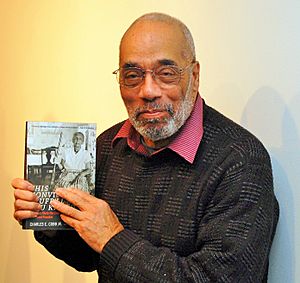Charles E. Cobb Jr. facts for kids
Quick facts for kids
Charles E. Cobb Jr.
|
|
|---|---|

Cobb at a talk about his book at Potters House in Washington D.C., on February 27, 2016.
|
|
| Born | June 23, 1943 |
| Occupation | journalist |
| Known for | Student Nonviolent Coordinating Committee |
|
Notable work
|
"This Nonviolent Stuff'll Get You Killed: How Guns Made the Civil Rights Movement Possible" |
Charles E. "Charlie" Cobb Jr. (born June 23, 1943) is a journalist, a professor, and a former activist. He was an important part of the Student Nonviolent Coordinating Committee (SNCC). This group worked for civil rights.
With other SNCC members, Cobb helped start a special bookstore. It was called Drum and Spear. This bookstore was in Washington, D.C. It was open from 1968 to 1974. Today, he works as a senior analyst at allAfrica.com. He is also a visiting professor at Brown University.
Contents
Who is Charles Cobb Jr.?
Charles Cobb Jr. was born in Washington, D.C., in 1943. He grew up in Springfield, Massachusetts. His parents were very involved in politics. His great-grandfather even started a farming community. It was called New Africa in Mississippi in 1888.
How Did Charles Cobb Jr. Get Involved in Civil Rights?
In 1961, Cobb began studying at Howard University. There, he became active in the Civil Rights Movement. This movement worked to end unfair treatment and segregation.
He read about and followed the sit-in protests. These were peaceful protests where people sat in segregated places. Cobb joined a protest against segregation in Annapolis, Maryland. He was arrested for peacefully refusing to obey an unfair law.
In 1962, he traveled to the Mississippi Delta. He became a field secretary for SNCC. This meant he worked directly with communities. He helped people register to vote and fight for their rights.
What Was Charles Cobb Jr.'s Role in SNCC?
Cobb worked as a SNCC field secretary until 1967. He mostly worked in Washington, Issaquena, and Sunflower counties in Mississippi. While in Mississippi, Cobb had a great idea.
He wrote a plan for SNCC to create Freedom Schools. He sent this idea in December 1963. Cobb believed these schools would help young Black Mississippians. They would fill a "vacuum" in their lives. He wanted them to learn to express their own hopes and questions.
What Did Charles Cobb Jr. Do After SNCC?
In 1967, Cobb visited Vietnam with Julius Lester. This trip was helped by the Russell Tribunal. After returning, he and other SNCC members started Drum and Spear Bookstore.
This bookstore was in Washington, D.C. For a time, it was the biggest bookstore in the country. It focused on books for and about Black people. He also helped create the Center for Black Education in Washington, D.C. Later, he traveled to parts of Africa. He lived in Tanzania in 1970 and 1971.
Charles Cobb Jr.'s Career in Journalism
In 1974, Cobb started his career in journalism. He began reporting for WHUR Radio in Washington, D.C. In 1976, Cobb started working at National Public Radio (NPR).
He was a foreign affairs reporter. He covered news about Africa for the network. Cobb helped NPR start its first coverage of African affairs. After leaving NPR, Cobb worked for the PBS show Frontline. He was a correspondent from 1983 to 1985.
In 1985, he became the first Black staff writer for National Geographic Magazine. He worked on their editorial staff from 1985 to 1997. Today, Cobb is a senior analyst at allAfrica.com.
Awards and Teaching
Cobb was a founding member of the National Association of Black Journalists. He was honored by being added to their Hall of Fame in 2008.
Currently, Cobb is a visiting professor at Brown University. He teaches a course there. It is called "The Organizing Tradition of the Southern Civil Rights Movement."
Books by Charles Cobb Jr.
- Radical Equations: Civil Rights from Mississippi to the Algebra Project, with Bob Moses (2001)
- No Easy Victories: African Liberation and American Activists Over a Half Century, 1950-2000, edited with William Minter and Gail Hovey (2007)
- On the Road to Freedom: A Guided Tour of the Civil Rights Trail (2008)
- This Nonviolent Stuff'll Get You Killed: How Guns Made the Civil Rights Movement Possible (2014)
 | Misty Copeland |
 | Raven Wilkinson |
 | Debra Austin |
 | Aesha Ash |

